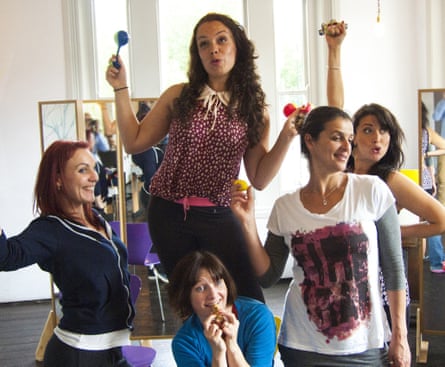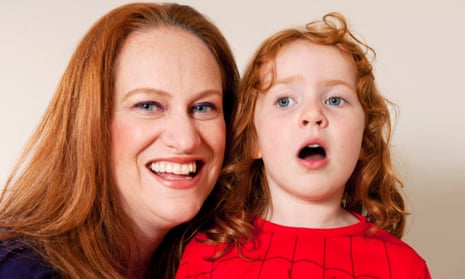Emily Beecher is the founder of the Good Enough Mums’ Club. She wears her badge with pride and has solemnly pledged never to tut at another mother, always to make time for wine and to accept that being good enough is best.
If you are a mother and ever feel you aren’t making a perfect job of it, she wants to recruit you. Four years ago, when her daughter Maisie was 10 months old, Emily was diagnosed with postnatal depression. She had been suffering, largely in silence, for seven months.
When she finally began to get the right treatment, her therapist suggested that writing about her experiences might be helpful. The Good Enough Mums’ Club – a somewhat unlikely sounding comic musical about the emotional onslaught of parenthood – is the result. “I pretty much wrote myself out of the darkness,” says Emily, 39, a Canadian television producer who has lived much of her life in London. “Initially it might be five minutes tapping on my phone, sitting on the loo,” she says, “but it became a lifeline. I hadn’t done a single creative thing since Maisie was born and this made it feel possible again.”
As she wrote about her own experiences, she also began to seek out those of other women. She found, to her surprise, that many others struggled with motherhood too. “I thought it was just me that was hopeless; that everyone else was coping fine. They clearly managed to do the shopping and get dressed,” she says. This belief that her difficulties were unique, caused not by illness but by basically being no good, had left Emily increasingly isolated while her symptoms worsened.
Within three months of her initial diagnosis – and despite antidepressants – Emily was plagued by constant, graphic visions of suicide. Her very presence, she believed, was ruining her daughter’s life.
“Eventually, the space between the visions and reality disappeared. I didn’t know what I was going to do. It was terrifying,” says Emily. Her GP diagnosed postnatal psychosis, a severe form of postnatal depression. He gave her anti-psychotic drugs, called her husband home from work on suicide watch and booked her a psychiatric bed.
The crisis was the catalyst for a programme of medication and counselling. “I began to sift through the rubble of my life and put it back together again,” says Emily.
On one horrendous day, she told her therapist she was giving up. “I was never going to be a great mum.”
She was surprised to be told that good-enough parenting is a recognised theory – DW Winnicott, the British paediatrician and psychoanalyst came up with it in 1953 – and that her therapist worked with more adult children of perfectionist parents than of neglectful ones. “It was a revelation,” says Emily. “We spend so much time trying to get it perfectly right, to be a particular type of parent. Why? It isn’t helpful to anyone.”
Emily realised that there was no perfect motherhood model against which to measure herself. “I finally saw that the mums I thought did everything right didn’t necessarily see themselves that way. Women aren’t always honest about how they are feeling. We think we are naturally supposed to be good at this, to nail it straight away. We fear we will be judged.”
As Emily’s new life began to take shape, so too did her writing. “Bizarrely, I just had to create a musical,” she says, laughing. “Early motherhood is supposed to be musical; all that singing of wheels on the bus, the bloody musical toys.”
The show won funding from the Knee High Project, a collaboration between the Design Council, Guy’s and St Thomas’s Charity and the London boroughs of Southwark and Lambeth, to improve the health and wellbeing of children under five. It opened in London in July before, Emily hopes, an eventual nationwide tour.
As part of the production process, groups of mothers saw parts of the show and were asked, in workshops, to contribute to its content.
“There are always women crying. They connect so quickly to what we are saying,” says Emily. “It is incredibly moving to put the show in front of the people who need it the most.”
“Lots of women come up to me afterwards and say that – apart from the psychosis, perhaps – I am telling their story. They thought it was only them who felt like that.”

Emily wants this musical to resonate with all mothers though, whether or not they have experienced the terrible lows of depression. She hopes to encourage more honesty and kindness. “I know the danger of pretending it is all OK. If you are honest, people judge less and help you identify when you need help. It is very hard to advocate for yourself when you are depressed. You can end up believing that it’s tiredness, that you need to take a walk, read a self-help book, pull yourself together.”
The show is set within a church hall mother-and-baby group. Five women thrown together by parenthood convene over anecdotes and coffee. As the story progresses, they gradually open up, dropping their judgmental guards and finally offering each other real support. Each character has her own story, but all, Emily says, are real. “I am not the mouthpiece of motherhood. I felt an obligation to all the women who shared their stories that this be true.”
At a focus group Emily ran, the mothers were asked what they wished they had known before parenthood. “One told us she wished she had known the price she would pay, despite the overwhelming love; that things would change so completely.”
The resulting song, Price to be Paid, is the point in the show which, says Emily, always chokes her up. “So I pick up the socks and the little shoes, I tidy the toys and fight back the blues,” sings one of the characters, “you’re one in a million, you’re my little babe, you’re worth the price of admission, the price to be paid.”
For most women there is, Emily believes, a cost – often unforeseen. “Be it career, relationship, spontaneity, bladder. In my case it was 13 months of my mental health and a total obliteration of the person I had been.”
Emily is determined that the show leave its audience laughing as well as crying though. “With parenting there are so many moments where you are pretty much doing both at once,” she says.
Audiences are asked to submit secrets, some of which will be added to each performance. “People love to confess,” says Emily. Already collected secrets include a pregnancy sex dream about the children’s entertainer Mr Tumble, a toddler whose first word was Tesco, and the pleasure of taking revenge on a husband who had the time for a hot shower. “That one was mine,” admits Emily (of her now ex-husband). “We had a number of toilets in the house and I used to have to flush them all. Repeatedly.”
As we speak, the cast – all mothers – are putting the finishing touches to a song about the indignities of childbirth. They will finish in time for baths and bedtime stories. Early rehearsals were held at Emily’s home. “Two of us are single mums so our daughters were there. We had clean versions of the songs which were suitable in their presence – What the ‘Heck’s’ Up with Kids’ TV and Everybody’s Got Their ‘Stuff’ Together. Maisie knows all those words, she’s just gutted she can’t be in it.”
The atmosphere, says Emily, is like a club. “We are in this together. The cast love being able to actually talk about their kids rather than have to pretend they don’t have any.”
She is thrilled that the show is finally ready to present. “It is a huge privilege and a reminder of how far I have come to use my story to help others as well as myself.”
“As mothers we will always worry about how we are doing, how our kids are doing, and wonder if we are doing enough. Doing enough and being enough are totally different things. I now know that it is OK to be a bit crap.”
The Good Enough Mums Club are collating stories of motherhood to be used in the development of the show for a major tour in 2015. For information on sharing your story, email mystory@thegoodenoughmumsclub.com or visit thegoodenoughmumsclub.com. facebook.com/TheGoodEnoughMumsClub

Comments (…)
Sign in or create your Guardian account to join the discussion